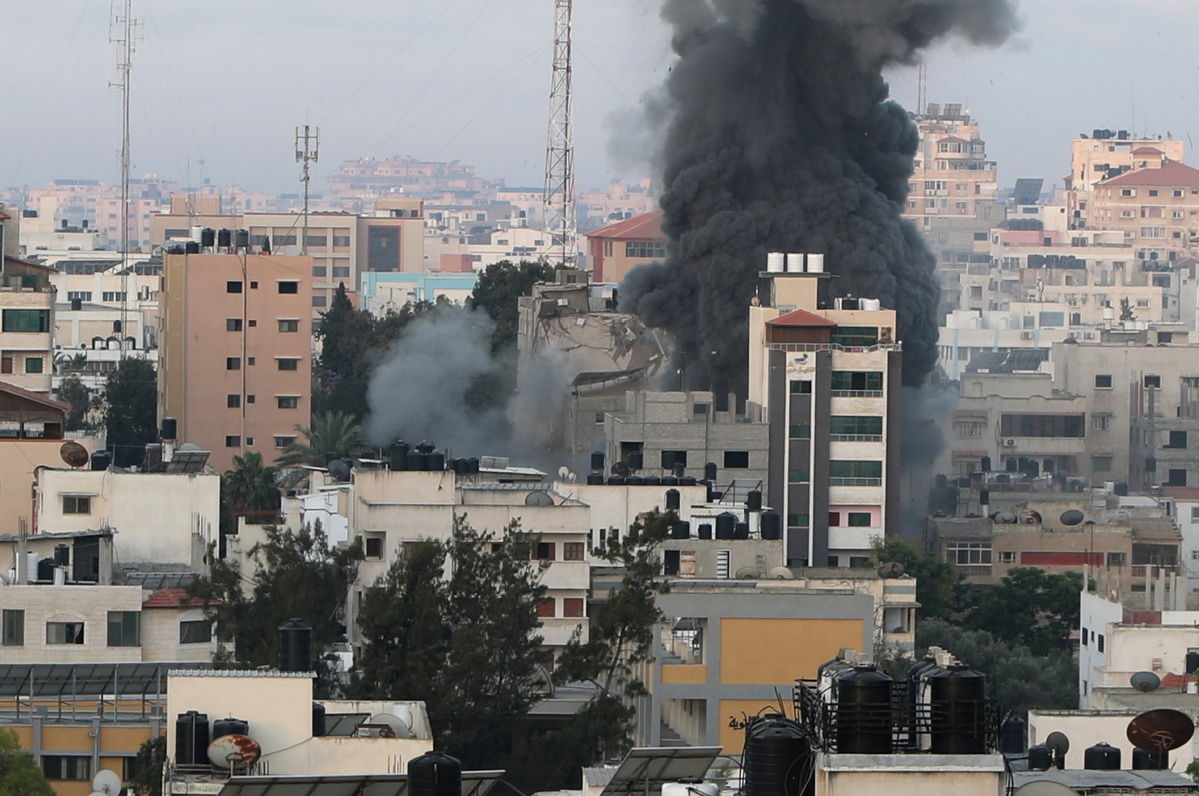US must help end Middle East conflict


Israel unleashed another round of air strikes on Gaza City on Monday which was heavier and on a wider area than the series of attacks a day ago in which 42 Palestinians were killed and the house of a Hamas leader was razed. The Israel-Palestine conflict has simmered since April, escalating sharply on May 10 after Hamas set an ultimatum for Israel to withdraw its forces from the Al-Aqsa Mosque compound, where hundreds of Palestinians were injured in clashes with Israeli police earlier that day.
That some Palestinian families in East Jerusalem neighborhoods such as Sheikh Jarrah face eviction to make way for Jewish settlements is main reason behind the latest escalation. Sheikh Jarrah is a predominantly, though not exclusively, Palestinian neighborhood, whose residents claim Israel is illegally evicting Palestinian families from their homes.
However, a private Israeli NGO claims it has the legal title to the property in question and the tenants have to be evicted because they have not paid the rent and thus breached the law. To a large extent, Sheikh Jarrah reflects the political development of Palestine over the years.
The escalation of the conflict can also be attributed to the coming elections in Palestine, and the uncertainty over government formation in Israel. The Palestinian presidential election to be held in July, too, faces uncertainties, as Palestinian President Mahmoud Abbas announced in April that the parliamentary elections scheduled for May 22 have been postponed until further notice. "We have decided to postpone the elections until the participation of our people in East Jerusalem is guaranteed," Abbas said.
In reality, however, disunity within, and a lack of confidence on the part of, the Palestinian National Liberation Movement, also known as Fatah, have led to the deferment of the parliamentary elections-Fatah fears that Hamas, which governs the Gaza Strip, will probably win the elections again, as it did in 2016, if they are held on time.
Unhappy with the postponement of the elections and to win the support of more Palestinians, Hamas launched a rocket attack on Jerusalem on May 10, inviting a disproportionately heavy response from Israel.
As for Prime Minister Benjamin Netanyahu, he missed the May 4 deadline to form a new government even six weeks after the country's fourth election in less than two years, prompting Israeli President Reuven Rivlin to invite opposition leader Yair Lapid to form a government. But the intensification of the conflict has upset the fragile balance between Arab and Jewish citizens in Israel and made it harder for Lapid to cooperate with the Arab parties to form a government. Which benefits Netanyahu.
The Iranian presidential election scheduled for June 18 could also have an impact on the Gaza conflict, not least because the Iranian government is closely linked with Hamas in Palestine, and the Hezbollah group in Lebanon, while Iran and Syria are strategic allies. Therefore, if the conflict escalates further, Israel will have to guard against potential attacks from militants in Lebanon and Syria.
But the current conflict is not likely to develop into a large-scale war, because despite strengthening its military, Palestine still lacks the firepower to confront Israel. On the other hand, Israel has its own concerns. If it pounds Gaza Strip too heavily, the international community will be forced to intervene. And given the barrage of rockets fired by the Palestinians despite being pounded by Israeli missiles, Israel realizes that if the conflict intensifies, it will face even fiercer attacks. So neither the Gaza leaders nor the Israeli politicians want the conflict to be prolonged.
Nevertheless, there is an urgent need for the United Nations, Arab countries that recognize Israel such as Egypt and the United Arab Emirates, as well as Turkey and some major countries to mediate between Israel and Palestine to end the conflict. In this context, the United States has a key role to play.
Israel-Palestine ties worsened and the interests of Palestinians were grossly compromised during the administration of previous US president Donald Trump, who controversially recognized the disputed holy city of Jerusalem as Israel's capital in 2017, and promoted the signing of the Abraham Accords in 2020 to normalize relations between Israel and some Middle East countries.
On its part, China, which assumed the rotating UN Security Council presidency this month, urged the council to hold two rounds of emergency consultations on the Palestine-Israel issue, in order to help end the conflict. But both meetings ended without issuing any statement on ending the conflict because the US opposed it. By taking the opposite position vis-à-vis the international community, the US allowed the Israel-Palestine conflict to intensify.
Since US President Joe Biden claims to be different from Trump, the international community hopes his administration will fulfill its international responsibilities by not opposing international justice and persuading Israel and Palestine to end the current hostilities and eventually reach an agreement to permanently settle the Israeli-Palestinian disputes.
The author is a professor at the Middle East Studies Institute, Shanghai International Studies University.
The views don't necessarily represent those of China Daily.


































